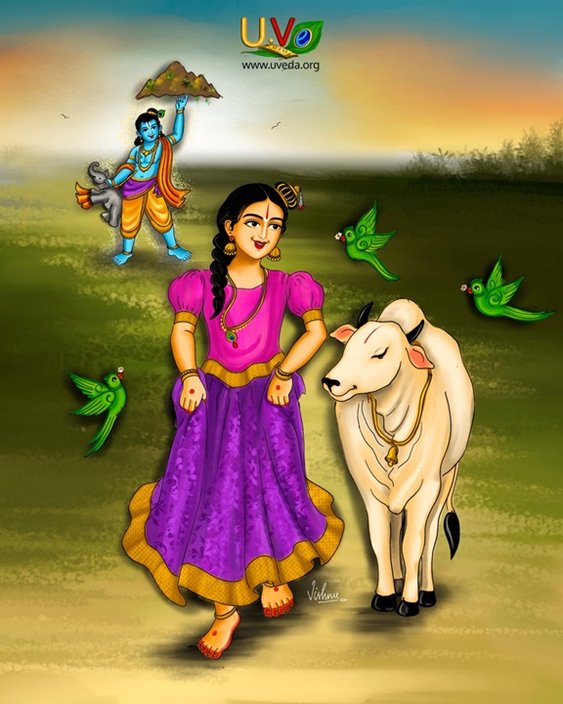TP 1.15
You Too Must Come and Sing of the Wondrous Lord
நீயும் வந்து மாயனைப்பாடு

488 எல்லே! இளங்கிளியே! இன்னமுறங்குதியோ? *
சில்லென்றழையேன்மின்! நங்கைமீர்! போதருகின்றேன் *
வல்லையுன்கட்டுரைகள் பண்டேயுன்வாயறிதும் *
வல்லீர்கள்நீங்களே நானேதானாயிடுக *
ஒல்லைநீபோதாய் உனக்கென்ன வேறுடையை *
எல்லாரும்போந்தாரோ? போந்தார்போந்தெண்ணிக்கொள் *
வல்லானைகொன்றானை மாற்றாரைமாற்றழிக்க
வல்லானை * மாயனைப் பாடேலோரெம்பாவாய்.
சில்லென்றழையேன்மின்! நங்கைமீர்! போதருகின்றேன் *
வல்லையுன்கட்டுரைகள் பண்டேயுன்வாயறிதும் *
வல்லீர்கள்நீங்களே நானேதானாயிடுக *
ஒல்லைநீபோதாய் உனக்கென்ன வேறுடையை *
எல்லாரும்போந்தாரோ? போந்தார்போந்தெண்ணிக்கொள் *
வல்லானைகொன்றானை மாற்றாரைமாற்றழிக்க
வல்லானை * மாயனைப் பாடேலோரெம்பாவாய்.
TP.1.15
488 ĕlle ! il̤aṅkil̤iye ! * iṉṉam uṟaṅkutiyo *
cil ĕṉṟu azhaiyeṉmiṉ ! naṅkaimīr ! potarukiṉṟeṉ *
vallai uṉ kaṭṭuraikal̤ paṇṭe uṉ vāy aṟitum *
vallīrkal̤ nīṅkal̤e nāṉe tāṉ āyiṭuka ! **
ŏllai nī potāy * uṉakku ĕṉṉa veṟu uṭaiyai? *
ĕllārum pontāro ? pontār pontu ĕṇṇikkŏl̤ *
val āṉai * kŏṉṟāṉai māṟṟārai māṟṟu azhikka vallāṉai *
māyaṉaip pāṭu-elor ĕmpāvāy (15)
cil ĕṉṟu azhaiyeṉmiṉ ! naṅkaimīr ! potarukiṉṟeṉ *
vallai uṉ kaṭṭuraikal̤ paṇṭe uṉ vāy aṟitum *
vallīrkal̤ nīṅkal̤e nāṉe tāṉ āyiṭuka ! **
ŏllai nī potāy * uṉakku ĕṉṉa veṟu uṭaiyai? *
ĕllārum pontāro ? pontār pontu ĕṇṇikkŏl̤ *
val āṉai * kŏṉṟāṉai māṟṟārai māṟṟu azhikka vallāṉai *
māyaṉaip pāṭu-elor ĕmpāvāy (15)
Ragam
Shaurāṣhṭra / சௌராஷ்ட்
Thalam
Aḍa / அட
Bhavam
Nāyaki (lovelorn lady)
Simple Translation
488. The girls address her: “Oh! sweet-tongued, beautiful one
like a young parrot! What is this? Are you still asleep? Wake up.!”
She answers, “Don’t shout and wake me up.
I am a poor girl and you are as bright as lightning. I’m coming.”
They say, “We know your tricks. You always say this.”
She answers, “You are the clever ones.
Let me be what I am.”
They say, “Come quickly. We can’t wait for you. ”
She asks, “Have all our friends arrived?”
They say, “Yes, They’re all here. If you want, come and
count them.
Come and sing the praise of the Māyan, who killed the mighty
elephant, vanquished the enemies and made them surrender.
Let us go and worship our Pāvai.
Velukkudi Sri. U. Ve. Krishnan Swami’s Upanyasam
TP.1.15
Word by Word (WBW) meaning
(The words may be rearranged to facilitate conversion from poetry to prose (Aṉvayam). Please read the meanings (in black) continuously to form the sentence and understand the simplified meaning based on the Divyārtha Dīpikai for the verse.)
இளங்கிளியே! — இளமையான கிளியே!; எல்லே! — இனிமையான பேச்சையுடையவளே!; இன்னம் — இன்னுமா; உறங்குதியோ! — உறங்குகிறாய்?; சில்லென்று — சள் சள் என்று; அழையேன்மின் — அழைக்காதீர்கள்; நங்கைமீர்! — தோழிகளே!; போதருகின்றேன் — இதோ வருகிறேன்; வல்லை உன் — நீ பேசுவதில்; கட்டுரைகள் — திறமை படைத்தவள்; பண்டே உன் — வெகு நாட்களாகவே; வாய் — உன் வாக்குத் திறமையை; அறிதும் — அறிவோம்; நீங்கள் — நீங்கள்தான்; வல்லீர்கள் — வல்லவர்கள்; நானே தான் — நானே வல்லவளாக; ஆயிடுக! — இருந்துவிட்டுப் போகிறேன்; ஒல்லை — சீக்கிரமாக; நீ போதாய் — நீ எழுந்து வா; உனக்கென்ன — உனக்கென்று; வேறு உடையை? — தனி உடைமை உண்டா?; எல்லாரும் — எல்லாரும்; போந்தாரோ — வந்துவிட்டார்களா; போந்தார் — வந்துவிட்டார்கள்; போந்து — வந்து; எண்ணிக்கொள் — எண்ணிக்கொள்; வல் — வலிய குவலயாபீட; ஆனை — யானையை; கொன்றானை — அழித்தவனை; மாற்றாரை — சத்ருக்களை; மாற்று அழிக்க — வலிமையற்றவர்களாக; வல்லானை — செய்பவனை; மாயனைப் பாடு — மாயனைப் பாட வருவாய்; ஏலோர் எம்பாவாய் — பெண்களே பாவை நோன்பு நோற்க வாரீர்!
il̤am kil̤iyĕ — ŏ gŏpikā, who looks like a young parrot (in speech and looks); ellĕ — wow! (how sweet is your speech!); innam — even after everyone has come and stood here; uṛangudhiyŏ — you are still sleeping? (and so they try to wake her up); nangaimīr — (gŏpikā from inside says) dear girls!; sil enṛu azhaiyĕnmin — please talk without fighting (with me);; pŏdharginrĕn — ī will start (now itself);; vallai — (from outside:) you are smart (in talks); paṇdĕ aṛidhum — we know for quite long; un katturaigal̤ — about your strong words; un vāi — and about your taking in length (but no action);; nīngal̤ĕ valleergal̤ — (from inside:) it is you who can talk strongly/rudely (as you are arguing with me); nānĕ thān āyiduga — (then truly accepts the fault as hers) ok, ī shall be the one who is talking strongly/rudely; (what do you want me to do?); — .; nee — (from outside:) you; ollai pŏdhāi — get up quickly.; unakku enna vĕṛu udaiyai — what separate goals/plans are you having?; ellārum pŏndhārŏ — (from inside:) has everyone come (who are supposed to come)?; pŏndhār — (from outside:) they have come,; pŏndhu eṇṇikkol̤ — you come out and count them; (from inside:) what do ī need to do after coming out? — .; pāda — (from outside:) to sing about; konṛānai — the one who destroyed; vallānai — the strong elephant (kuvalayāpīdam); māṝārai māṝu azhikka vallānai — and who can destroy the strength of enemies; māyanai — that is, kaṇṇan, who does wonderful actions.; (so please get up). — .
Detailed Explanation
ellē iḷam kiḷiyē
When the gopikās asked the gopikā from the previous pāśuram to sing about Kaṇṇan, who has beautiful eyes and holds the śaṅkha (conch) and cakra (discus) in His divine hands, the gopikā in this pāśuram, lying in her bed, heard them and began to hum that song.
The sweet sound of her humming reached the ears of the other gopikās, and